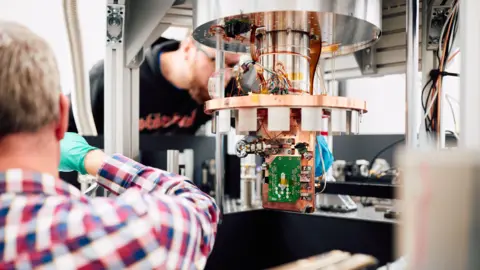'Pivotal' quantum computing chip unveiled
 Oxford Ionics
Oxford IonicsA chip that experts have said could be "pivotal" to creating effective quantum computers has been unveiled.
Oxford Ionics has said its chip can be mass-produced and means the world's first useful quantum computer could be built in three years time.
The new technology makes it possible to do very complex calculations extremely quickly and solve problems too difficult for regular computers.
University of Oxford Associate Professor of Quantum Computing Aleks Kissinger said the new chip was "very promising".
Oxford Ionics said only one technology - trapped ions - has demonstrated the performance needed to build a useful quantum computer.
The new chip created by the Kidlington-based company, is designed to be capable of controlling these trapped ions - providing over twice the performance of previous attempts.
The company said the results indicate that "the dawn of useful quantum computing is far closer than previously thought".
Dr Tom Harty, co-founder and chief technical officer at Oxford Ionics, said: "This is an incredibly exciting moment for our team, and for the positive impact that quantum computing will have on society at large.”
 Oxford Ionics
Oxford IonicsWhat is quantum computing?
Quantum computers make use of the weird qualities of sub-atomic particles.
So-called quantum particles can be in two places at the same time and also strangely connected even though they are millions of miles apart.
The computers found in most of our homes and workplaces process data in bits, which have a binary value of either zero or one.
Quantum computers instead use a two-state unit for data processing called a qubit.
Experts and physicists say this means that the problems combed over by average computers for years could be solved in a matter of minutes.
Source: BBC
'Practical challenges'
Prof Kissinger said: "There have already been functioning quantum computers for a number of years, but they are generally much too small and their results are much too noisy for real-world applications.
"We still don't understand very well the full potential of large-scale quantum computers.
"There are still lots of practical challenges that come from scaling a little device up to something you could use to solve real problems, but this looks very promising."
Dr Michael Cuthbert, who is the director of the UK’s National Quantum Computing Centre - which is based in Didcot - added: “The new results mark a pivotal step forwards in ion trap quantum computing and validates the scalability of the technology."
Follow BBC South on Facebook, X (Twitter), or Instagram. Send your story ideas to [email protected] or via WhatsApp on 0808 100 2240.
